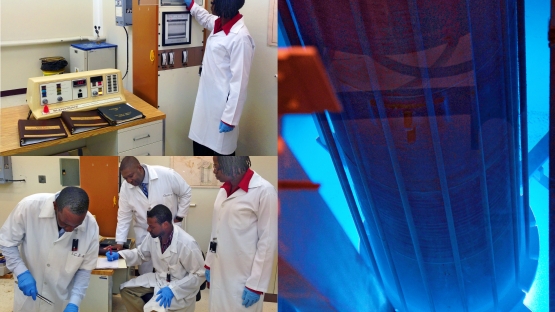The Caribbean’s only research reactor will be converted to low enriched uranium (LEU) fuel later this year, decreasing non-proliferation risks while doubling the reactor’s utilization capacity. The conversion of the reactor from highly enriched uranium (HEU) to LEU fuel is part of a joint effort between the governments of Jamaica and the United States, with support from the IAEA. The spent fuel will be returned to the United States.
“The additional capacity will allow us to expand research work related to food safety, food security, water and air quality,” said Charles Grant, Director General of the International Centre for Environmental and Nuclear Sciences (ICENS) at the University of West Indies in Kingston, Jamaica. “With the additional capacity we will be able to accommodate the research needs of other countries” from the Caribbean, he added.
The fuel conversion is part of global efforts, supported by the IAEA, to eliminate the risks associated with HEU, while still maintaining important scientific research. HEU, in which the proportion of uranium-235 isotopes is above 20 per cent, is a security concern, because it could also be used for producing material used for nuclear weapons.
During the last 30 years, Jamaica has operated a 20 kW research reactor (Slowpoke II type) at the University of the West Indies with results in environmental, agricultural, and health-related studies, mineral exploration, as well as in education and training. Up to 50 students from around the region use the reactor as part of their studies, Grant said. ICENS is jointly funded by the Government of Jamaica, through the Ministry of Science Technology Energy and Mining, and the University of the West Indies.
In November 2014, Jamaica requested assistance from the IAEA to assist with the conversion of the research reactor from HEU to LEU fuel, in addition to supporting future operational needs, and ensuring that the process is carried out in full compliance with IAEA safety and security standards, and meets all safeguards provisions. The implementation plan for the conversion and future assistance were discussed at a meeting between Jamaican and U.S. government representatives and IAEA officials in March.
Manuel Recio, Acting Director of the IAEA Division for Latin America and the Caribbean, highlighted the importance of the reactor for Jamaica and the wider region. “This endeavour should not be regarded as a one-of-a-kind effort, but as an opportunity to bring to a successful conclusion ongoing efforts to put in place a solid legal and governmental infrastructure for nuclear and radiation safety in Jamaica and an opportunity to expand existing cooperation with the IAEA and partners in peaceful uses of nuclear technology,” he said.
Following the conversion, the reactor will be operational 16 hours a day, up from eight hours currently, Grant explained, and will play a key role in increasing the contribution of nuclear techniques in a variety of sectors in the Caribbean.
The country hopes to secure help from the IAEA Technical Cooperation Programme to enhance their capacities in the use of nuclear techniques, and eventually offer services to other countries in the region. These could include offering dosimetry services to hospitals and other workplaces handling radioactive sources and to build a regional capacity building centre for emergency preparedness.
Jamaica is also in a good position to become a reference point to four new Member States from the Caribbean, the Bahamas, Dominica, Guyana, and Trinidad and Tobago, as well other small island states in the region, Recio said.
With the additional capacity we will be able to accommodate the research needs of other countries."




